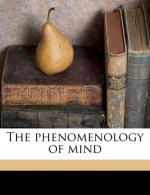
|
| Name: _________________________ | Period: ___________________ |
This quiz consists of 5 multiple choice and 5 short answer questions through Observation of Nature as an Organic Whole.
Multiple Choice Questions
1. How does Hegel define "irritability"?
(a) As a failure of reflection.
(b) As a constant in conscious life.
(c) As an organism's ability to act out.
(d) As a the consequence of reconciliation.
2. What qualities does Hegel describe as being necessary for organic entities?
(a) Reflective.
(b) Self-preserving.
(c) Capable of perception.
(d) Self-conscious.
3. What does consciousness rest on in Hegel's account?
(a) Reason.
(b) Perception.
(c) Intuition.
(d) Understanding.
4. How does the double consciousness unify according to Hegel's philosophy?
(a) By embracing the divine.
(b) Through mediation and transformation.
(c) By submission of the body to the spirit.
(d) By transcending the physical.
5. What does Hegel explain in the introduction of The Phenomenology of Mind?
(a) Why the work is necessary to his times and to humanity.
(b) Why he was the only one who could have written this work.
(c) Where the inspiration for the work came from.
(d) Where the work fits in the history of philosophy.
Short Answer Questions
1. How does Hegel describe force?
2. What does Hegel say the meaning of life is for every individual?
3. What are the elements in Hegel's account?
4. Which claim does Hegel make about the mind?
5. According to Hegel, why is even a killer dissatisfied with the self-certainty that comes from killing another person?
|
This section contains 345 words (approx. 2 pages at 300 words per page) |

|




